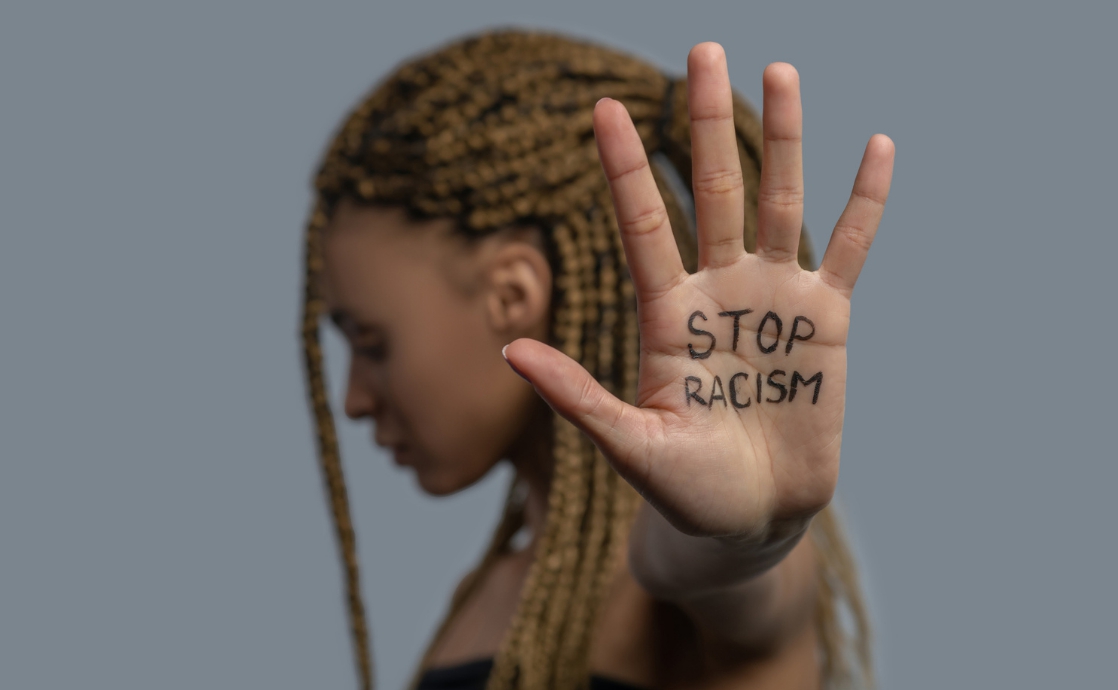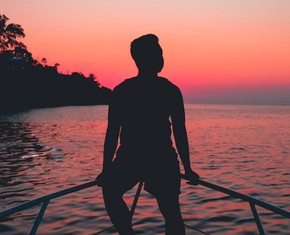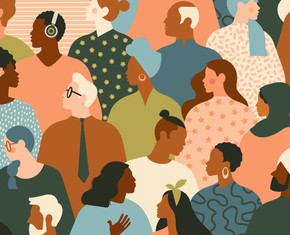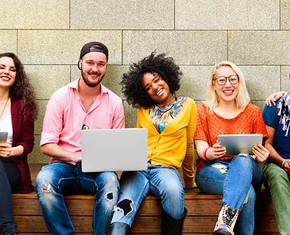The views expressed in our content reflect individual perspectives and do not represent the authoritative views of the Baha'i Faith.
Recently I got into an online dialogue with a guy named Jack, a man certain that skin color predicted criminality. All of the young Black men shot by police, Jack opined, had done something to warrant it.
This baffled me, because I’ve been a Baha’i since the age of 19, and in the time since, I have striven to assimilate the core teachings of Baha’u’llah about the oneness of humanity into my life so that they become second nature:
O Children of Men! Know ye not why We created you all from the same dust? That no one should exalt himself over the other. Ponder at all times in your hearts how ye were created.
RELATED: Abdu’l-Baha: Radical Anti-Racist
I asked Jack what John Crawford III of Beavercreek, Ohio had done to deserve being shot, and reminded him that Crawford, 22, was killed in a Walmart while standing passively in an aisle, talking on the phone, loosely holding a BB gun he’d picked up on a toy shelf. The toy weapon was pointed at the floor when the policeman shot him, mere seconds after seeing him. The White man who’d called 911 and falsely reported a live shooter was never prosecuted for giving a false report.
“He must’ve done something,” Jack said with utter certainty.
This is bias.
Bias plays a huge part in the way we regard, react to, and treat other human beings. As the Universal House of Justice, the democratically-elected global administrative body of the world’s Baha’is wrote in 1985:
Racism retards the unfoldment of the boundless potentialities of its victims, corrupts its perpetrators, and blights human progress. Recognition of the oneness of mankind, implemented by appropriate legal measures, must be universally upheld if this problem is to be overcome.
Jack was of the opinion that Black men were inherently scary because they were of a race prone to violence, so it made sense to him that the police would react to them differently than to white men.
At this point, and as a White woman, I said something that Jack found shocking: “I have never in my life been afraid of a Black man.”
I made a point of the fact that this wasn’t because I hadn’t encountered many Black men in my life. I had, and in a variety of situations: Black men were schoolmates, friends, coworkers, fellow Baha’is, people I met on the street, band dads like my husband.
Jack wrote a number of things in response, but this one stood out:
Her comment about having no fear of black men puts this all in context. She lives in a politically-correct Utopian fantasy. As a woman, you’d think black misogyny would at least be on her radar, but she acts like only white guys are rude or dangerous. It’s utter nonsense. I wonder what neighborhoods she’s actually walked in? A few random blacks in a nice area is not representative of what the police deal with. There’s rampant black violence in Chicago, Baltimore, D.C., Detroit, Oakland, etc. Any time you have large numbers of blacks in an area (mainly young black men) the crime rate is high. It’s just a fact.
After I stopped laughing at the words “politically-correct Utopian fantasy” (couched in language that didn’t even address me directly), I responded this way:
You made wild assumptions about me that are so far off the mark, I had to laugh. To be clear, the reason I have never been afraid of a Black man, whether I was walking in the Tenderloin or Oakland or Boston or Manhattan or my own neighborhood is, again, because none of them acted toward me in a way I found threatening. And when I looked into their faces and read their eyes, I saw not the tiniest hint of threat. A couple of them flirted with me. Some of them were funny, and kind, and interesting. At least one was homeless. Three of my dear friends and fellow Baha’is are Black men. One is a lawyer; one was a police officer; one plays a mean sax. All three of my friends are big, imposing men. But they are not scary if you take a moment to look past your biases into their eyes.
The only men I have ever had reason to fear were white. That’s hardly utopia, but it is my personal experience. I’m sorry it doesn’t tally with your dystopian view of the world or of people who don’t share your skin color.
Skin color doesn’t determine criminality. Environment does. Where people are living in crushing poverty and despair, with little or no opportunity for education, or work, or even decent food, some will come to believe that fighting for resources or turf is the only way to survive. One thing that helps break this cycle is education — specifically in well-integrated schools with good teachers and ample resources.
I don’t live in a “politically-correct Utopian fantasy.” I live in San Jose, California, not far from downtown. Our cul-de-sac has a mixture of Black, Hispanic, Vietnamese, Caucasian, and racially-mixed families. We moved here from what the State Police refer to as a rural white enclave that claims to have no racial problems.
San Jose has schools that are quite wealthy and whose kids have every advantage. It also has schools that are poor and that rely heavily on volunteerism for programs the school can’t afford. My daughter chose to go to one of these poorer schools because of its excellent band program. Over 70 per cent of the student body (mostly from families of color) were on subsidized lunch programs. My daughter was in the minority; we could afford to put money in her lunch account. Her senior year, a man living just down the street from the high school left a pipe bomb in the student parking lot, forcing an hours-long lockdown. He was not Black.
This is our neighborhood.
Three blocks from our house several years back, a man shot his wife dead; he wasn’t Black. A block from our house is a 7-11 where my daughter goes to grab snacks. A man was shot right across the street under a tree where a shrine appears annually on the anniversary of this death. I don’t know what color the shooter was.
This is our neighborhood.
Men in vans try to pick up school girls, prompting waves of police cruisers to roll down our streets. These men come in a variety of colors. There’s a multi-racial homeless encampment just down the road that I’m hopeful our local government will turn into a portable housing block (if it’s not NIMBY-ed out of existence).
This is our neighborhood.
Years ago, there were gangs in the area; kids are still not allowed to wear red or blue to neighborhood schools because red and blue were the gang colors – not Black. These days, gangs steal catalytic converters from Priuses while other folks eke out a living stealing packages from doorsteps and selling the goods on eBay. I just watched a neighbor’s NextDoor video of a woman stealing from their porch. She was White.
RELATED: Is Promoting Racial Unity a Spiritual Responsibility?
These things don’t happen in my neighborhood because of skin color. They happen because of poverty. The gangs exist because marginalized people feel the need to have a tribe to belong to. The hostility between tribes exists because of biases that filter what we see when we look at each other. I belong to a number of tribes, but they’re tribes that understand they don’t have to define themselves by who they’re against. The more this understanding spreads, the closer we’ll be to overcoming the sort of bias that prejudges someone based on something as superficial as the color of their skin.
For now, Jack, we’ll just have to keep evolving.
You May Also Like
Comments

















I never feared for him as a youngster. Now that he is in the age group that has always resisted authority, no matter if it is parents, teachers (or if I am honest, grandparents) and he clearly, visibly fits the preconceived somatotype that generates intense, deep-seated fear among many who carry a badge, a gun, and the legal authority to use it to take a ...life first and justify it later (perhaps), I worry about him and his mother (my White daughter) every time he leaves the house.